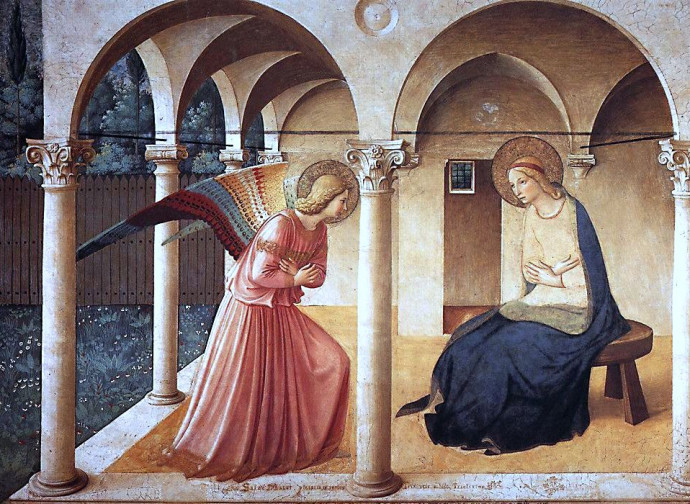Annunciation of the Lord
To manifest His omnipotence God chooses Nazareth, a secondary town in the peripheral region of Galilee. And above all he chooses the most humble Mary.

“Hail Mary, full of grace, the Lord is with thee.” The Archangel Gabriel's greeting to Mary uniquely sums up the mystery of the Annunciation, the central event in human history that reveals all of God's love for His creature, called to cooperate in His plan of salvation. It is in the Annunciation that the first of the ancient promises is fulfilled and the wait for the Saviour is answered, completely surprising human expectations from the outset. To manifest His omnipotence God chooses Nazareth, a secondary town in the peripheral region of Galilee. And above all he chooses the most humble Mary, who after the heavenly messenger's greeting, still troubled, hears the words: “Do not fear, Mary, because you have found grace with God. Behold, you will conceive a son, give birth to him, and call him Jesus”.
The splendid page of the Gospel according to Luke (Lk 1:26-38) reports that Mary asked how she could be virgin and mother: (“How is it possible? I know no man”). This question will certainly have accompanied many children of Israel since the time of Isaiah's enigmatic prophecy: “Behold, the virgin will conceive and bear a son who will be called Emmanuel” (Is 7:14), which means "God with us", as the evangelist Matthew had already noted. Mary then learned from the Angel that she was the virgin announced by the prophet: “The Holy Spirit will descend upon you; the power of the Most High will overshadow you. He who is born will therefore be holy and will be called Son of God”. Announcing to Mary that her cousin Elizabeth had miraculously conceived, Gabriel finally set the seal on the immense plan with the Incarnation of the Word (summum opus Dei, as the blessed Duns Scotus called it), which the Almighty had planned for her and through her: “Nothing is impossible to God”.
Mary not only believed but freely and fully offered her whole person to the divine plan: “Behold, I am the handmaid of the Lord. May it be done to me according to your word.” From the instant of that yes of hers, so docile and submissive to the divine Will, she became the Ark of the New Covenant, who “with ineffable love carried the firstborn of the new humanity” (Preface), namely Jesus, the new Adam. For this reason Saint Anselm of Aosta, meditating on original sin, could say that Mary is the Mother of the re-creation of mankind. The Child conceived in her virginal womb, the premise for the Redemption through His sacrifice on the cross, is the tangible sign of God's fidelity and His desire to save man, so that he may share in divine life. The hidden God, whose name many Jews did not even dare pronounce, revealed Himself by becoming flesh in the fullness of time and already manifesting in His name the reason for His descent among men: “You will call him Jesus”, which means God is salvation.
The Solemnity of the Annunciation is generally celebrated on March 25, but its celebration is postponed when this date coincides with a Sunday in Lent or if it falls during Holy Week or the Easter octave. The solemn liturgy on the day of the Annunciation is attested to in a canon of the Tenth Council of Toledo (656), which highlighted its spread throughout the Church, a sign of even more ancient origins. The date of 25 March is directly linked to that of Christmas, since it is nine months earlier. The Roman Missal recalls that “erudite calculations and mystical considerations also fixed the event of the first creation and renewal of the world at Easter on 25 March”. On the subject of erudite calculations it is necessary to mention Dionysius The Little, who - around 525, having been commissioned to develop a mathematical method for the date of Easter - began to number the years “from the Incarnation of Our Lord Jesus Christ”. A perennial reminder of the pivotal event of salvation, which exhorts us to say yes, as Mary did.
